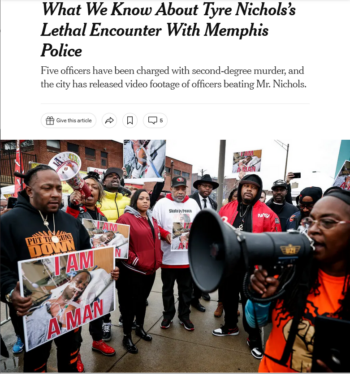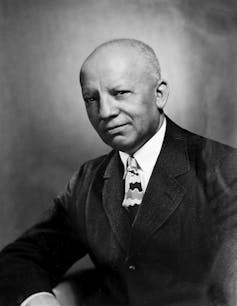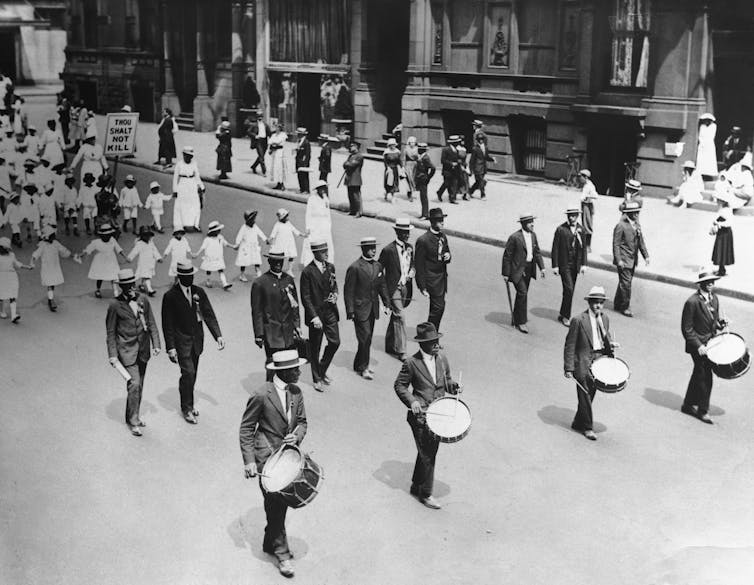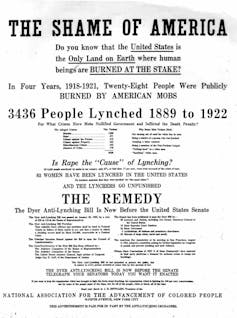Janine Jackson: The clearing of land, including forests, in South Atlanta, to build a gigantic police training complex brings together so many concerns, it’s hard to know where to begin.

NPR (3/11/23)
The January police killing of a protester and environmental activist known as Tortuguita, whose autopsy suggests they were sitting down with their hands raised when cops shot them multiple times, is a flashpoint illuminating a constellation of harms proposed by what’s been dubbed “Cop City,” as well as resistance to them.
Our guest is in the thick of it. Kamau Franklin is founder of the national grassroots organization Community Movement Builders, and co-host of the podcast Renegade Culture. He joins us now by phone from Atlanta; welcome to CounterSpin, Kamau Franklin.
Kamau Franklin: Hey, thanks for having me. I really appreciate it.
Cop City seems to bring together so much that is wrong and painful for Black and brown people. But we can actually start with the land itself. The place where this paramilitary police camp is planned has some meaningful history, doesn’t it?
KF: Yeah, this land, which has been dubbed by us the Weelaunee forest, was originally the home of part of the Muscogee nation. The Muscogee nation was the native occupiers of that land, the original occupiers of that land, and they were removed in an ethnic cleansing war by the United States from that land and pushed off.
And since that time period, the land has been used, initially, partly as a plantation, where enslaved Africans were brought to the land and made to work on that land. Later, the land was transferred into a prison farm, where working-class people and poor people and, again, particularly Black folks were put on the land to continue working for the state at, obviously, no wages, being punished and harassed and brutally treated.
The land has also served as a youth imprisonment camp, and the police have done trainings on that land.
So that land has been, over a time period, used for the brutal and harsh treatment of Black people in particular, but also of poor and working-class people.
One quick thing I want to say, also, is that that land, in terms of it being a forest before the invention of Cop City, was promised to the adjacent community, which is 70% Black, as a recreational and park area, particularly as the land re-forested itself over time, park areas where there were supposed to be nature trails, hiking available, parks available, and when the idea of Cop City arose, from the Atlanta Police Department, the City of Atlanta and the Atlanta Police Foundation, all of those plans were scrapped immediately, without any input from that adjoining community, and instead they decided to move forward with this idea of Cop City.

New Republic (3/9/23)
JJ: I think that’s why folks are talking about, I’ve heard a reference to “layers of violence” at work here. And I think that’s what they’re getting at is, there’s what this place would be for, its purpose, and then there’s also the process of how it is being pushed on people that didn’t want it. And then there’s also the physical, environmental impact of the construction. It’s a lot, and yet they’re all intertwined, these problems.
KF: Yeah, this is a perfect illustration of how the state, vis-a-vis the city, the state government and even, in some ways, the federal government, operate in tandem, and a lot of times, most of the time, it doesn’t matter what party they are, but operate in tandem at the whim of capital and at the whim of a, relatively speaking, right-wing ideological outlook.
And, again, it doesn’t matter which party it is we’re talking about. It doesn’t matter whether or not those folks are Black or white, but an ideological outlook that says overpolicing in Black and brown communities is the answer to every problem.
And so here in particular, you talked about the process. This process of developing Cop City came after the 2020 uprisings against police violence, the 2020 uprisings that were national in scope, that started after Breonna Taylor, George Floyd and, here in Atlanta, Rayshard Brooks was killed by the police, and it caused a massive uprising and movement across the nation again.
The response by the authorities here in Atlanta was to push through their plans on building Cop City, to double down on their efforts, again, to continue the overpolicing of Black communities, particularly here in Atlanta. Atlanta is a city that is gentrifying at an astronomical rate. It’s gone from a 60% Black city to one that’s less than 50% in only a matter of 20, 30 years, all of that under Black leadership.
It’s a city that, in terms of those who are arrested, 90% of those who are arrested in Atlanta by the police are Black people; its jails are filled with Black people.
And so this is a city that doubled down on police violence and police militarization after these uprisings.
In addition, we feel like the part of Cop City, in terms of its militarization—over a dozen firing ranges, its mock cities to practice urban warfare, its military-grade structure that it’s bragging about—the fact that its past facility is called the Paramilitary Center, and this one is also going to be a paramilitary center.
In its earliest iterations of what it was supposed to be, it included a landing pad for Black Hawk helicopters, something they’ve now said that they’ve taken out.
This, for us, has been put forth to harass and stop future mobilizations and movements and uprisings against police brutality and misconduct.

Guardian (2/9/23)
It was pushed through the City Council. Seventy percent of the people who called in on the night of the vote voted against Cop City, but yet the City Council members decided to still enact this. And so this has been run over the heads of the community, without community input.
And it is something that we think is dangerous for both the overpolicing, and, as you restated earlier, the environmental concerns of stripping away a forest of 100 acres immediately. This particular area is something that is given to having floods. Once they start stripping even more of the forested area away, there’s going to be even more and increased floods.
The loudness of the shooting, the other things that’s going to be happening, this is going to be something that’s extremely detrimental to the environment, and the continued degradation of the climate, if it is allowed to take place and happen.
JJ: I think folks listening would understand why there are multiple points of resistance, why there are a range of communities and folks who would be against this. Some listeners may not know, people have been protesting Cop City for years now.
But now, Tortuguita’s killing amid ongoing protests has given an opening for corporate media to plug this into a narrative about “violent activists” and “clashes.” And this is par for the course for elite media, but, and I’m just picking up on what you’ve just said, it’s especially perverse here, because we’re seeing community resistance and rejection of hyper-policing presented as itself a reason for more of that hyper- and racist policing. It’s a knot. It’s a real complicated knot here.
KF: No, you’re exactly right. And we should say, again, that people have been protesting against Cop City since we found out about it in 2021. And our protests have been, since its beginning, met with police violence.
When we were protesting at City Hall, doing petition drives, town halls, contacting our legislators, when all that was happening and we were doing protests at City Hall and other places, the police would come and break up our protests.
They conducted over 20 arrests during the early stages of our protest movement against Cop City. At that particular time, people were being arrested for charges of disorderly conduct, resisting arrest, obstruction of governmental administration.

LA Times (3/15/23)
After they passed the resolution to grant the lease to the Atlanta Police Foundation, and part of our tactics began to have—there were folks who moved to the actual forest and became forest defenders as an act of civil disobedience.
Then the policing agency in Atlanta basically hooked up and created a task force. So the Atlanta Police Department, DeKalb County Police Department, Georgia Bureau of Investigation, the Federal Bureau of Investigation and Homeland Security actually formed a task force where they first began having discussions on bringing charges of state domestic terrorism.
And so in December of last year, they conducted a raid in the forest and arrested approximately five or six people. And those were the first folks who were charged with domestic terrorism.
On January 18, they did a second raid, and they charged another five or six folks with domestic terrorism, and that was the raid in which they killed Tortuguita, the forest defender, activist and organizer who, again, as you pointed out earlier, through a private autopsy done by the family, because the Georgia Bureau of Investigation refuses to release information on their supposed or alleged investigation into this matter, the private autopsy is the first indication we have that the police narrative on how they were killed was a complete lie.
Tortuguita was sitting cross-legged and hands were up to protect their face from the firing directly into their body, they were hit approximately 13 times. And it may be more, but the second autopsy could not determine which were exit wounds and what were entry wounds.
After the killing of Tortuguita, another six or seven protesters were arrested at a rally downtown. And then this past Sunday, during our week of action against Cop City, another 35 arrests took place; 23 of those people were charged with domestic terrorism.
So we now have approximately 41 or 42 people who have been charged with domestic terrorism. And this is a scare tactic meant to demoralize the movement. And it’s also meant to criminalize the movement in the eyes of the larger public.
And this is something that’s been a tactic and strategy of the state since day one. But with the help, as you said, of corporate media, they’re trying to get this narrative out there. And we’re left to fight back against this narrative, which is obviously untrue.
JJ: And it’s been long in the works, and long on the wish list. I remember talking to Mara Verheyden-Hilliard about J20, about people who had been arrested protesting Trump’s inauguration, and the slippery tactics that, not just law enforcement, but also the courts were using to say, you were near a person or dressed similarly to a person who we believe committed a crime against property, and therefore you are swept up in this dragnet and charged with felonies, and with a lifetime in prison.
And let’s underscore, it’s a scare tactic. It’s a way to keep people in their homes. It’s a way to keep people from coming out in the street to use their voice on issues they care about.

Kamau Franklin: “These domestic terrorism charges are purposely meant to put fear in the heart of organizers and activists, not only on this issue, but in future issues.”
KF: Yes, definitely. I think it’s important what you pointed out, I’m sure viewers may have seen pictures of property destruction.
And, again, this movement is autonomous, and people are engaged in different actions. We don’t equate property destruction with the violence that the police have rained on Black and brown communities over centuries, to be clear; we don’t equate the idea of property destruction with the violent killings that led to the 2020 uprisings and the prior violent killings by the police of unarmed Black people over, again, decades.
But what’s important to point out even in these arrests, is that the folks who have been arrested and charged with domestic terrorism, who are actually involved in acts of civil disobedience at best, the people in the forest who were arrested during the first two raids we spoke about, were people who were sitting in tree huts and sitting in camps under trees, that police had no evidence whatsoever to suggest that they had been involved, either at that time or prior, in any destruction of property.
And even if they did have such evidence, then the correct legal charge would be vandalism or destruction of property. These domestic terrorism charges are purposely meant to put fear in the heart of organizers and activists, not only on this issue, but in future issues, when the state levels its power, it’s going to say that you tried to, and this is how broad the statute is, attempt to influence government policy by demonstrative means—so civil disobedience can be interpreted as domestic terrorism.
And this is the first time in Georgia that the state statute has ever been used. And the first choice to use it on are organizers and activists who are fighting against police violence.
JJ: And are we also going to see, I see Alec Karakatsanis pointing out that we’re also seeing this line about “outside agitators.” You know, everything old is new again. In other words, all these old tropes and tactics, it seems like they’re all coming to the fore here, and one of them is the idea that this isn’t really about the community. This is about people who are professional activists, professional troublemakers, and the phrase “outside agitators” is even bubbling up again. And that’s a particular kind of divide-and-conquer tactic.
KF: Most definitely. We should be clear that the heart of the Stop Cop City movement has been organizers and activists and community members, voting rights advocates, civil rights advocates, who have either been born or who have lived in Atlanta for a number of years.
But that movement has welcomed in people from all across the country to try to support in ending Cop City, whether or not that’s national support that people give from their homes, and/or whether or not that’s been support that people have traveled down to Atlanta to give support to either forest defenders or the larger movement to stop Cop City.
We see the language of “outside agitators” as being, as you said, a trope that is born from the language of Southern segregationists, that were used against people like Dr. King, the civil rights movement, Freedom Riders.
And so when we have Black elected officials parroting the language of Southern segregationists, it tells us how far we’ve come in terms of having representative politics, where basically you have Black faces representing capitalism, representing corporations, representing developers who have turned their back on the working-class and poor Black communities who they’ve helped pushed out of the city, in favor of these corporations, and in favor on strengthening a police apparatus that, again, is going to be used against every Black community that they claim to represent.
JJ: Well, finally, one of the corporate investors in Cop City, along with Home Depot and Coca-Cola and Delta, is Cox Enterprises, which owns the Atlanta Journal-Constitution, which I understand is editorially supportive of Cop City.
I wonder what you’re making of local media that may be in contrast to national media or international media. And then, as a media critic, it’s strange, but a lot of what I want to say is, don’t follow them, don’t look to media to tell you about what’s happening, about what’s possible, about who matters, because it’s a distortion.
So I want you to talk a little about the resistance for folks, but also, maybe they’re not seeing that resistance in their news media, and there are reasons for that.
KF: We have a couple of reporters, I’ve singled them out, who have attempted at least to give a fair hearing to the struggle around Cop City.
However, the overwhelming local reporting has been in favor, and has led continually with the police narrative, with the city narrative, with the state narrative on this benign training center, as they present it, and these “outside agitators” we spoke of earlier, organizers who are coming in. That’s been the central narrative.
So even when we talk about police violence, they never use the term “police violence.” They only use “violence” in conjunction with the organizers and activists, that’s whether or not a so-called peaceful protest has been taking place and the police arrest organizers. And that’s whether or not there’s this quiet civil disobedience by staying in the woods. Anytime organizers or activists are brought up, they don’t hesitate but to use the word “violence.”

Atlanta Journal-Constitution (8/21/21)
And so we understand that not only the media that’s directly connected to Cox, which is a funder of the Atlanta Police Foundation and a funder of Cop City, and, as you stated, editorially, has put out four, five, six, editorials that have all been supportive of Cop City, and that have all tried to label organizers and activists as “violent.” But other corporate media, local corporate media, has been on that same bandwagon, except for a few notable exceptions.
We’ve gotten much better press, much, much more favorable hearings, that at least tells our side, from national media, from outlets who have a perspective and understand what organizing and activism and capitalism is vis-a-vis the way the society works, and from international media.
The things that have helped us get the word out to talk about the struggle has been media platforms like this, and others which have a perspective that understands the role of the United States, and the United States government entities and corporations, and how the world is run.
Without that perspective, we would be completely at a loss to get the word out in any way that could be considered fair and/or accurate.
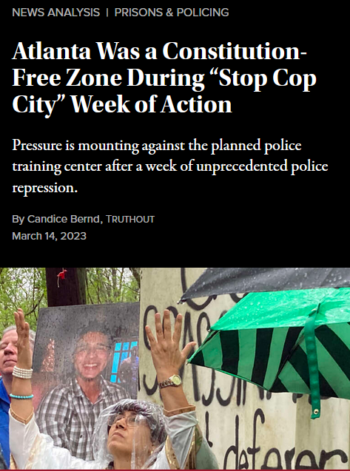
Truthout (3/14/23)
JJ: You want to shout out any reporters or outlets? I would say Candice Bernd at Truthout has been doing some deep and thoughtful things on it. And, internationally, I’ve seen a few things. But if there are reporters or outlets that you think deserve a shout out, by all means.
KF: The Guardian has done a good job of representing organizer and activist concerns. As you said, Truthout. Millennials Are Killing Capitalism, as a podcast, has done a fantastic job. Cocktails and Capitalism has done a fantastic job. We’ve had some good reporting in Essence magazine, actually.
And so there have been outlets that have given us, again, a fair hearing on our views on the history of policing, on understanding capitalist development and capital development and corporate development here, not only in Atlanta, but in other urban cities across the country.
And so we thank those outlets for at least the opportunity to give voice as we fight back against a dominant corporate narrative that is all about supporting the police, supporting violent and militarized policing, and supporting the continued criminalization of movements that fight against it.
JJ: We’ve been speaking with Kamau Franklin. He’s founder of the national grassroots organization Community Movement Builders. They’re online at CommunityMovementBuilders.org. He’s also co-host of the podcast Renegade Culture. Kamau Franklin, thank you so much for joining us this week on CounterSpin.
KF: Thank you for having me. I appreciate it.
Originally published on FAIR.org, March 24th, 2023. Reprinted with permission.







